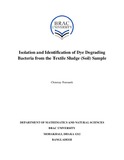Isolation and identification of dye degrading bacteria from the Textile Sludge (Soil) sample

View/
Date
2014-08Publisher
BRAC UniversityAuthor
Pramanik, ChinmayMetadata
Show full item recordAbstract
Textile industry is one amongst the most chemically intensive industries on the
face of the earth and the major contaminator of potable water. It produces huge
amounts of different complex chemical substances as a part of unused materials
that includes dye in the form of wastewater throughout various stages of textile
processing. The direct discharge of this wastewater into surroundings affects its
ecological status by inflicting various undesirable changes. Bacteria isolated from
the textile sludge (soil) sample and inoculated into screening media containing
different types of textile dye in aerobic condition to attain the biodegradability of
the dye. Within 24 hours of incubation, this strain proved to be a good decolorizer
of the dye. Most preferable pH and temperature for dye degradation were pH 7-7.8
and 29-32 °c under aerobic condition. Various nutrient sources such as sodium
chloride, beef extract, yeast extract, or peptone strongly boost the decolorization /
degradation process and the bacterial efficiency. All the samples showed positive
results for the decolorization of the dyes. Under aerobic condition, color of all the
dyes reduced by the bacterial biomass that leads to biodegradation.
